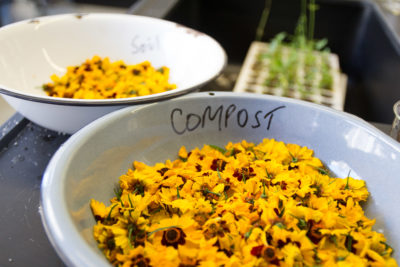
A garden grows at FIT (and it grows better with muslin compost).
FIT’s Textile Development and Marketing (TDM) Department has received a $15,000 grant from the Environmental Protection Agency to study the growth of coreopsis and indigo—two plants known for their yellow and blue pigments, respectively—with the aid of compost derived from excess muslin discarded by FIT Fashion Design students.
TDM Chair and Professor Jeffrey Silberman and Associate Professor Ajoy Sarkar sought the grant in an effort to see if muslin compost affects the growth rate of plants, as well as the richness of the resulting pigment and the colors’ interaction with cotton fabric (e.g., color absorption and colorfastness).
Over the course of approximately eight weeks, two sets of coreopsis and indigo—one planted in regular topsoil and one planted in topsoil mixed with 10 percent muslin compost—were grown in special tents in a TDM lab. The yellow flowers of the coreopsis plants and the leaves of the indigo plants were harvested in early April.
 It was immediately clear that the compost-enhanced coreopsis had yielded nearly twice the number of yellow flowers as those planted in plain topsoil. The indigo, too, had grown taller and fuller than its non-compost counterparts. When Sarkar did an initial extraction of the color from the muslin and compost-grown coreopsis, he saw that it was markedly deeper and brighter than the extraction from the control group.
It was immediately clear that the compost-enhanced coreopsis had yielded nearly twice the number of yellow flowers as those planted in plain topsoil. The indigo, too, had grown taller and fuller than its non-compost counterparts. When Sarkar did an initial extraction of the color from the muslin and compost-grown coreopsis, he saw that it was markedly deeper and brighter than the extraction from the control group.
This research is an outgrowth of the college’s commitment to sustainability and an effort to prove viability on a larger scale in order to evaluate the potential impact for industry. The first step of this process will be to move the growing operations to Silberman’s farm in Westchester, NY. Silberman and Sarkar have submitted a new proposal and request for funding to the EPA, which would go toward this next phase.
In mid-May, Silberman and Sarkar will travel to Washington with students Lydia Baird, Shona Neary, Jillian Oderwald, and Jessica Trippiedi to compete against 34 other “P3” teams, the designation for People, Prosperity and Planet. EPA’s P3 program is a unique college competition for designing solutions for a sustainable future. P3 offers students quality hands-on experience that brings their classroom learning to life. For the first phase of the competition, teams are awarded a $15,000 grant to develop their idea. They showcase their research May 14-17 at the National Sustainable Design Expo hosted by TechConnect World 2017 as part of the competition for an additional grant of up to $75,000 to apply their design to a real-world application.
“What they like to see is that the projects move out of a lab and are commercially feasible,” Silberman said. And commercial feasibility is, in fact, the endgame for this project. The bottleneck for FIT is that the college’s compost output is not high enough to accommodate an expansion like this, so Sarkar and Silberman are talking to two organizations that could potentially assist with the process. One nonprofit may help shred FIT’s muslin waste, and a second organization may be willing to take the shredded muslin for composting before it goes to Silberman’s farm in Westchester.
The by-products of cotton farming include gin waste, linter (the short fibers clinging to cotton seeds after ginning), and cotton seeds. “If we can show that by composting we can improve the soil on a cotton farm, we can recycle the waste the farm would normally be trying to get rid of,” Silberman said.
“We’re getting one step closer to commercialization,” Silberman said, “so we’ll keep building on this and see what it turns into.”
